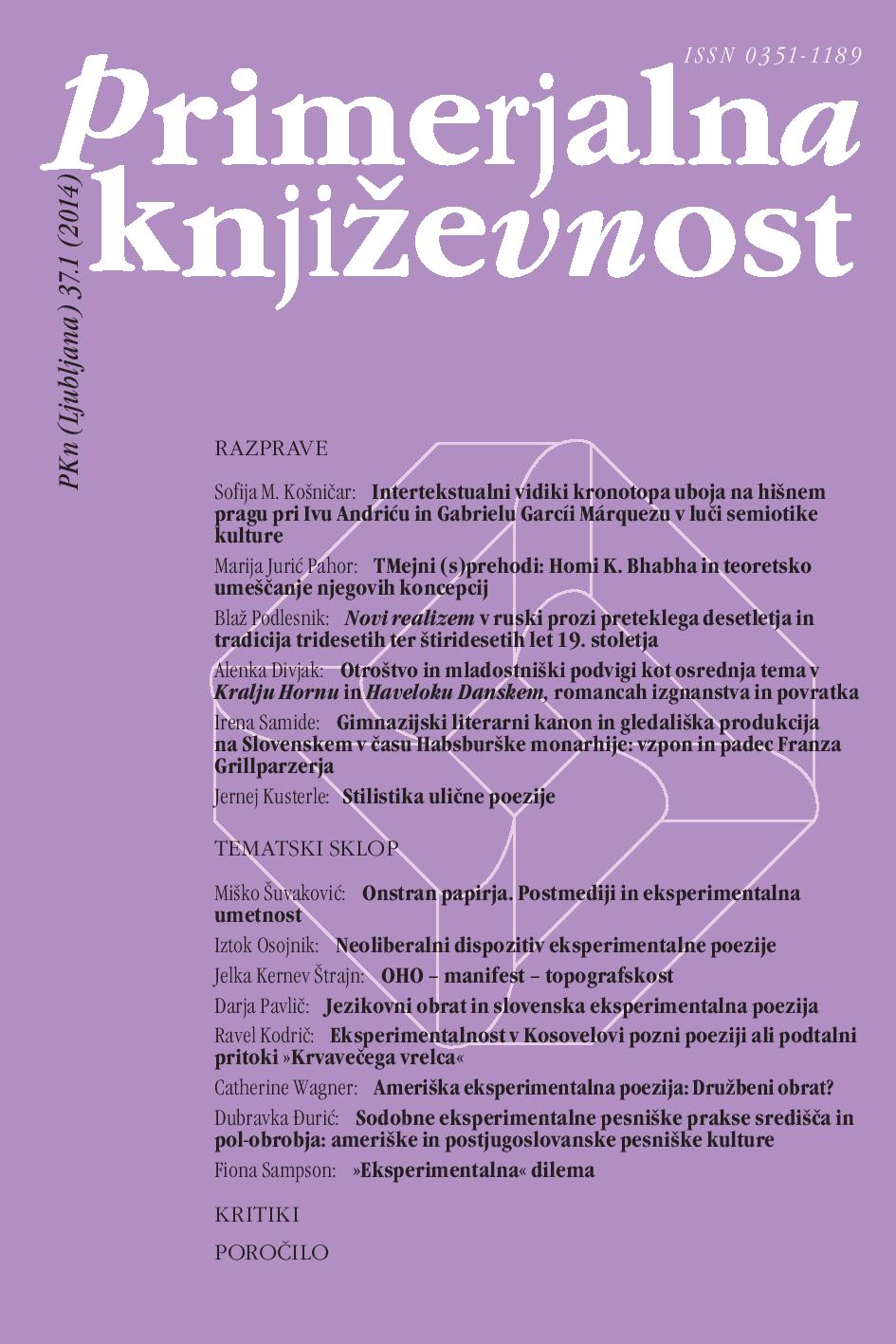Kosovel’s Late Poetical Experimentalism or the Underground Inflows of His “Bleeding Gush”
Keywords:
Slovenian poetry, Kosovel, Srečko, experimental poetry, constructivismAbstract
The paper compares Kosovel’s manuscript “Krvaveči vrelec” with the versions edited by Anton Ocvirk (1974) and Neža Zajc (2013), highlighting discrepancies, blunders and lapsus lecturae. Their correction allowed to identify the source of the collage elements of the first stanza in a single number of the Slovenian liberal daily Jutro, released on Thursday, February 11, 1926, a few months before the poet’s death. – The second stanza is a sarcastic rhetorical question, referred to the government crisis, which loomed because of claims for ethnic autonomy put forward by the head of the Croatian Peasant Party, Stjepan Radić, seconded by Anton Korošec, the head of the Slovenian leading clerical party, against the government headed by the centralist Serb Nikola Pašić. This threat promptly waned because of the submissive capitulation of the promoters themselves, as clearly implied by the poet himself, a staunch supporter of Balkan federalism based on the right of peoples to self-determination. – This dating proves that constructivism was the last evolutionary stage in Kosovel’s poetry. – The image of the bleeding jet solidifying into a radiant “vivid red ruby obelisk” in the third stanza finally echoes the similar image of “eine zuckende Blutsäule”, used by the German expressionist poet Ludwig Rubiner (1881–1920), the author of the anthology Kameraden der Menschheit. Dichtungen zur Weltrevolution (1919), a hitherto neglected source of inspiration for Kosovel’s poetry. – The paper finally proposes a psychoanalytic interpretation of the lapsus lecturae that led Anton Ocvirk to read the word Falzifikatorska in the manuscript as Fabrobikoborska, and identifies its unconscious drives in the early ideological divide that opposed the two young men during the last months of the poet’s life. It culminated in 1928 with Ocvirk’s letter of overt reactionary and obscurantist denunciation sent to the Catholic daily Slovenec, meant to denigrate Kosovel’s memory as well as his closest friends and spiritual heirs who ran the leftist monthly Mladina. This divide was pointed out by Kosovel’s friend Ivo Grahor in his two reviews of the collection of Kosovel’s poems edited by Ocvirk in 1931.References
Badiou, Alain. Dvajseto stoletje. Prev. Ana Žerjav. Ljubljana: Društvo za teoretsko psihoanalizo, 2005.
Barnini, Barbara. »Aktuelles.« 13. 12. 2012. Rubiner e le avanguardie artistiche europee: la Slovenia e Srečko Kosovel (1904–1926). Splet. www.rubiner.de.
Buber, Martin. Ich und Du. Leipzig: Insel Verlag, 1923.
Cencič, Mira. Kosovelovi v Tomaju. Tomaj: Kulturno društvo, 2014. 71.
DELO. Glasilo Komunistične stranke Italije 1–7. Trst, 1920–1926.
Freud, Sigmund. Psihopatologija vsakdanjega življenja: o pozabljanju, spodrsljajih v besedi in ravnanju, zmotah in praznoverju. Prev. Rapa Šuklje. Ljubljana: Mladinska knjiga, 2013.
Grahor, Ivo. »Književna poročila. Srečko Kosovel: Izbrane pesmi.« Ljubljanski zvon (1932): 50–55.
− − −. «Srečko Kosovel: Izbrane pesmi.« Modra ptica 3.2 (1932): 58–59.
JUTRO. Dnevnik za gospodarstvo, prosveto in politiko. Ljubljana, 11. in 12. 2. 1926.
Kosovel, Srečko. Integrali ‘26. Izbral, uredil in uvodno študijo »Srečko Kosovel in konstruktivizem« napisal Anton Ocvirk. Ljubljana: Cankarjeva založba, 1967.
− − −. Izbrane pesmi. Ur. in uvod napisal Anton Ocvirk. Ljubljana: Tiskovna zadruga v Ljubljani, 1931.
− − −. Kosovel: Bibliographie, portraits, fac-similés. Prev. Marc Alyn. Pariz: Pierre Seghers, 1965. (Poètes d’aujourd’hui, 127)
− − −. Ostri ritmi = Aspri ritmi. Prev. Jolka Milič. Uvod Miran Košuta. Trst: ZTT EST, 2011.
− − −. Zbrane pesmi. Zbrala in ur. Neža Zajc. Spremna beseda Igor Grdina. Ljubljana: Študentska založba, 2013.
− − −. Zbrano delo I–III. Ur. Anton Ocvirk. Ljubljana: DZS, 1946–1977.
Kreft, Bratko. »Srečko Kosovel in socializem.« Primorski dnevnik, Trst, 27. maj 1966.
Le tesi di Lione. Riflessioni su Gramsci e la storia d’Italia. Ur. Franco Angeli. Milano: Fondazione Feltrinelli, 1990. (Quaderni 39)
Lokar, Anica. Od Anice do Ane Antonovne. Ljubljana: Mladinska knjiga, 2002.
Martelanc, Vladimir. »Die Frage des revolutionären Kampfes des slowenischen Volkes.« La Fédération Balkanique 1.18–19 (30. april 1925): 249–250.
− − −. «K vprašanju revolucionarne borbe slovenskega ljudstva.« La Fédération Balkanique 1.17 (1. april 1925): 240.
− − −. »Narodno vprašanje v naši politiki v Julijski Benečiji (1923–1927).« Prispevki za zgodovino delavskega gibanja 20.1–2 (1980): 119–129.
− − −. «Srečko Kosovel.« Delo. Glasilo Komunistične stranke Italije 7.270 (1. julij 1926): 2.
MLADINA, mesečnik za sodobna slovenska kulturna vprašanja. Ljubljana: Konzorcij Mladine, 1924–1928.
Novak, Boris. A.. »Kosovel, velik pesnik in slab verzifikator.« Kosovelova poetika. Ur. Janez Vrečko, Boris A. Novak in Darja Pavlič. Primerjalna književnost 28. Posebna številka (2005): 7–17.
Ocvirk, Anton. »Mladina in njen kulturni pomen.« Slovenec, političen list za slovenski narod 45 (23. februar 1928): 6–7.
Pertot, Jože. »Pota mladine.« Komunistični koledar za navadno leto 1922. Ur. Dragotin Gustinčič. Trst: Socialna Matica »Ljudskega odra«, 1921. 151–167.
Pinthus, Kurt. Menschheitsdämmerung. Symphonie jüngster Dichtung. Leipzig: Rowohlt Verlag, 1920.
Pogačnik, Jože. »Slovenski konstruktivizem.« Obdobje ekspresionizma v slovenskem jeziku, književnosti in kulturi. Ur. Franc Zadravec. Ljubljana: Filozofska fakulteta, 1984. (Obdobja 5)
PRIMORSKI SLOVENSKI BIOGRAFSKI LEKSIKON – PSBL. Snopič 1–20. Gorica: Goriška Mohorjeva družba, 1974–1994.
Rubiner, Ludwig. Der Mensch in der Mitte. Berlin-Wilmersdorf: Verlag der Wochenschrift Die Aktion, 1917.
− − −. Kameraden der Menschheit. Dichtungen zur Weltrevolution. Stuttgart: Akademischer Verlag Stuttgart, 1979.
Vrečko, Janez. Srečko Kosovel. Ljubljana: Založba ZRC, ZRC SAZU, 2011.
Zapiski Delavsko-kmetske matice. Ljubljana: Delavsko-kmetska matica, 1925.
Žižek, Slavoj. »Privoliti v radikalno brezno subjektivnosti, to je edina rešitev.« Intervju pripravil Samo Kutoš. Literatura 15.150 (december 2003): 261–287.


